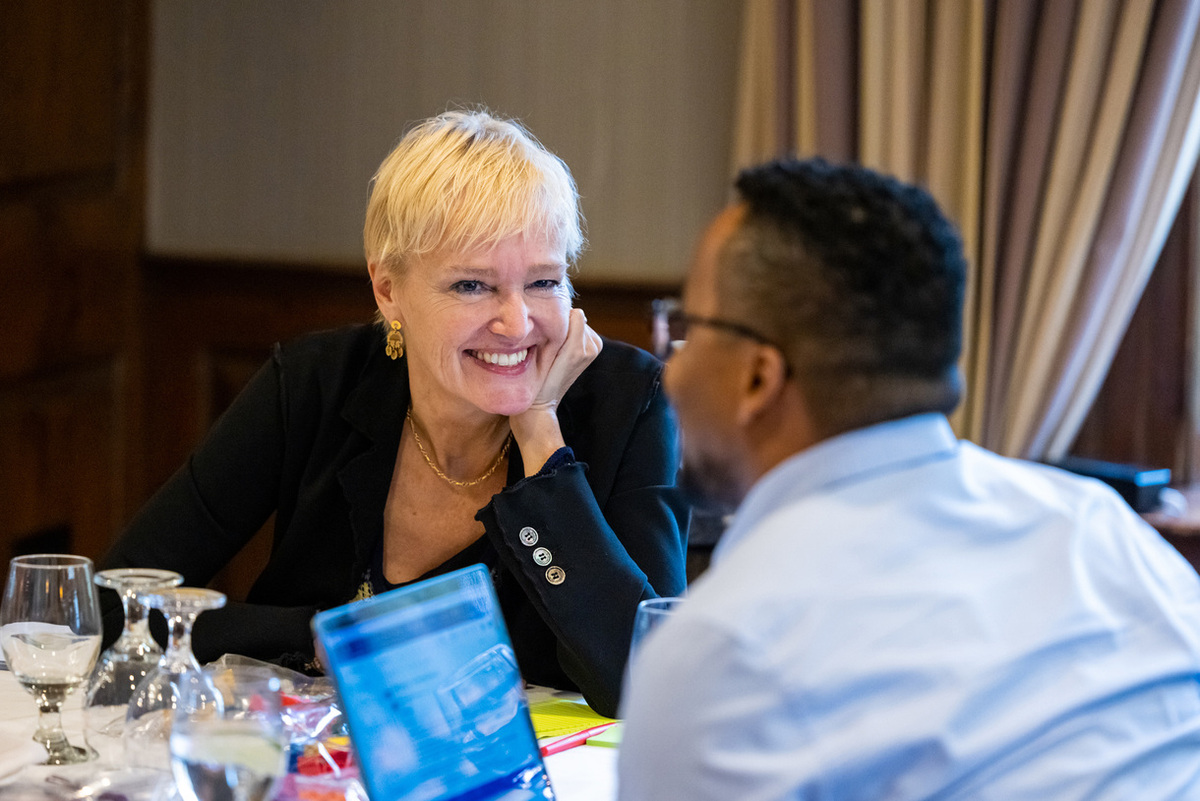According to the United Nations Educational, Scientific and Cultural Organization, one-in-three students graduating with an undergraduate or graduate degree from a higher education institution today is coming out of business management, law or economics. Or, on current accounted-for figures, 70 million out of just over 200 million students. “Imagine the kind of influence [educators] already have via these students and the organizations that they come to work in,” Professor Mette Morsing enthuses.
But what if, she asks, educators could recenter that influence a little more towards a societal impact and planetary climate change orientation?
“So that these students that are coming out make decisions in businesses, governments and non-governmental organizations with another kind of theoretical framework, another kind of conceptualization of what matters,” she explains.
As the Head of PRME (Principles for Responsible Management Education), a United Nations Global Compact initiative, Morsing tells The CEO Magazine that instead of the old paradigm, where short-termism and shareholder supremacy ruled supreme in business school curriculum, the new ideal is to educate managers with a gaze towards society and not just the corporation.
Describing PRME as a “global movement”, Morsing explains that it was established by then United Nations Secretary-General Ban Ki-moon in 2007 and is an initiative for CEOs to voluntarily adopt sustainability principles into their businesses. “PRME came into existence because the idea was, if you want to change business, you have to change how business is taught,” she adds.
“If you want to change business, you have to change how business is taught.”
Morsing joined in 2020, moving from her native Denmark to New York at the height of COVID-19 pandemic lockdowns in the city. With a master’s and PhD in business, she’s spent her career teaching in leading business schools and has been part of the PRME story since the beginning: first at Copenhagen Business School, where she was Professor of Corporate Social Responsibility at the Department of Management, Society and Communication, and, from 2017 onwards, at the Stockholm School of Economics as Mistra Chair of Sustainable Markets and Executive Director of Misum Mistra Center for Sustainable Markets.
The schools are two of the approximately 850 management-related higher education institutions that are PRME signatories, having made a voluntary commitment to implement six principles designed to transform business education by advancing responsible management education: purpose, value, method, research, partnership and dialogue. Yet that represents less than 10 percent of the total number of business schools in the world (a figure she estimates at roughly 14,000). And it’s Morsing’s focus to spread the message further.
“The United Nations Sustainable Development Goals, or sustainable development in general, is not something we should leave as some sort of exotic course in the business school curriculum,” she says. “It needs to be integrated into all dimensions of our programs and curriculum.” That way, she reasons, any student graduating with a finance degree and, for example, a marketing specialization, enters the workforce with an understanding of what sustainability means from a marketing perspective, as well as the capacity to make informed decisions that serve to make the world a little greener or contribute to human rights improvements.
The impactful five
Of course, to achieve this, the professors also need to be supported. “We need to help and educate the finance professor that may not have a PhD in sustainable finance, for instance, and provide case studies and theorizing that will make it easier to teach these skills in the classroom,” she explains.
“Because it is a daunting thing. In some places of the world where the professor is the authority, it is challenging to teach the Sustainable Development Goals because there is no one right answer to how you address them.”
“The United Nations Sustainable Development Goals, or sustainable development in general, is not something we should leave as some sort of exotic course in the business school curriculum.”
And it’s exactly this challenge that is behind one of PRME’s major initiatives, the Impactful Five – or i5. With the emerging need for leaders with a new holistic skillset, one where critical thinking and complex problem solving are valued above all else, educators have a critical role in equipping tomorrow’s leaders with these skills.
“There’s an ambition for students to be more socially and emotionally equipped so that when they make investments or decisions in their career, they can also consider whether they are good for equality, human rights, planetary boundaries,” she explains. “That’s not something we usually teach in business schools.”
The i5 program focuses on five characteristics: making learning meaningful; facilitating active engagement; designing for iteration; developing supportive social interaction; and fostering joy and wellbeing. “We are asking our faculty to engage themselves, but also help students not just focus on cognitive skills, but on social, emotional, creative and physical skills,” Morsing says.
Power in partnerships
At its core, PRME is a global learning community for academics, students, businesses and other thought leaders. As part of its commitment to the initiative, each business school signatory commits to reporting on their progress in implementing the six principles. Morsing describes the content, known as a SIP (Sharing Information on Progress) report as an “unexplored gem”. “We need to make the report something that we can share with our colleagues in other schools,” she says.
Through a partnership with Economics of Mutuality (EoM), Morsing hopes to create a digital knowledge-sharing platform where firm examples of how sustainability is being weaved into the business curriculum can be shared across its schools and beyond. “We have a unique opportunity to create a global narrative of the huge positive impact that business schools have on society and planetary betterment,” she explains.
“We have a unique opportunity to create a global narrative of the huge positive impact that business schools have on society and planetary betterment.”
PRME and the EoM alignment in their missions creates a “beautiful, energizing partnership”, Morsing says. “We will start to build and enforce the definition of mutuality into the curriculum of our schools and the pedagogies we inspire.”
She knows there’s still a long way to go, but Morsing’s enthusiasm for the future is evident. Especially when considering the potential reach across all faculties. “This is relevant for finance professors, for accounting professors, for marketing professors,” she says. “It’s challenging, but I’m very excited.”
The PRME roadmap
To achieve its vision of realizing the 17 United Nations Sustainable Development Goals through responsible management education, Morsing explains that PRME has sketched out a road map with four dimensions:
Curriculum change: “We need to revisit curriculum to review it and to put society, including of course the planet, at the center of our stakeholder model instead of the corporation.”
Skillset development: “We need to think differently about how we educate our students so they become critical thinkers and problem solvers.”
Practical Relevance: “We need to consider how we bring practical relevance into the classroom because we’re teaching curriculum from North America and Europe in Africa but what is relevant in Botswana may differ from what is relevant in Quebec.”
Impact: “Our colleagues in science, medicine and mathematics are very good at telling the world what societal impact they bring. In the social sciences, particularly in business, we’re not good enough at making the narrative of how we collectively impact the world in a good way.”







